If you know me you know I'm a huge fan of theirs and the chance to sit down with them for an extended period was a gift that was beyond belief. The thought of doing it wigged me out because I didn't want to mess it up so as I tried to work out twenty minutes of intelligent sounding questions I rewatched their films, listened to interviews and commentaries and slowly de-stressed myself when I realized they seemed to be really good guys.
The guys were in New York for the run of the collection of their films Zeitgeist Films put together and that has been traveling around the country. The colectionis three of the brothers films plus Christopher Nolan's latest, an 8 minute bio of the brothers. They were also doing interviews to tie in with the Blu-ray of their films which takes the old Zeitgeist collection but adds in the Nolan film and three other films (editor's note: the disc was originally due out tomorrow, hence the publication today, but has been pushed back to November 24)
The interview was conducted at The Film Forum in New York. It was in their conference room, which is a fancy name for a really cool room full of film stuff with a table and chairs in the center.
I arrived about a half an hour early since it as a hot day and I wanted to seem calm and cool, which I wasn't. I was first sitting on a bench waiting to be taken upstairs. I was going over my notes as various people passed me to go to the restrooms, including one of the Quays who was so at ease and relaxed you'd never know he was world famous.
I was then brought upstairs to the office outside the conference room to await the arrival of everyone. I used the time to get out my recorder and get ready. Then the door swung open and the Quays came in with Emilie Spiegel of Cineticmedia who was arranging everything and another woman whose name I didn't catch.
I stood to shake hands and in a manner that you only see in comedies it was everyone put out hands to shake and then hesitation as we switched around and around again. There was laughter as we talked about it and how we could have made it funnier. One of the Quays disappeared into the conference room and the other went to check email...
After crashing on to a bench loudly (everyone looked and laughed) I steadied myself before being lead into the conference room....
One HUGE bit you need to know- when I shook hands with the Quays, and even after we sat down- I was never told which was Stephen and which was Timothy. I still don't know and I spent half an hour with them. That would all fine and good- I should have inquired as to which was which so I could adjust things out when I transcribed everything- except that as much as they look a like they also sound alike as well-so I don't know who was saying what. I am not sure that what lists as Stephen in the interview is what he said nor am I sure that what Timothy said- the transcription labeling is a best guess. I was told to just list what they say as The Quays, except this was a conversation between three people and not an interviewer and a single entity. There are a couple of places where I use the general Quays designation primarily where they literally spoke as one saying alternating words or sentences.
What follows is pretty much exactly what happened- minus a couple of flubs and what became a running joke of interruption by the intercom. The weird voices from the ether reduced us to laughter on a couple of occasions and I would have included it but it makes for poor reading.
Lastly I need to thank some people- Emilie Spiegel for setting this up, Randi Mason for helping me double check spellings and such, and of course to Timothy and Stephen Quay for sitting down with me
EMILIE: Steve, I'll give a knock when you have five minutes, so you know to ask the last question...
STEVE: OK...
EMILIE: ...and then we'll come in...
STEVE: ...I'll just...
QUAYS: And she's pretty brutal... You think that keyhole's small.
[laughter]
STEVE: She's listening, everything's wired.
[laughter]
STEVE: Thank you for taking the time.
QUAYS: A pleasure.
STEVE: Um, how do people react when they meet you? I ask this because it's like, until I started to see interviews with you, I'm wondering, "What sort of strange people are these guys?"
STEPHEN: But they're not.
TIMOTHY: We're not.
STEVE: Now I know that...
[laughter]
STEVE: ...and I look at the interviews that you've done on video you seem to be such lovely...
STEPHEN: Boy Scouts, right?
TIMOTHY: Yeah, it's the Boy Scout ethic.
STEVE: It's crazy.
[At this point the interview is put on pause as some one from the Film Forum enters looking for the wine the brothers have brought with them]
FF: Sorry to interrupt. Hi.
TIMOTHY: Hi.
FF: I heard there was Prosecco at this interview.
QUAYS: Ahhhhh!
STEPHEN: There's only two glasses.
[laughter]
TIMOTHY: Bring your glass...Steve?
STEVE: No, no, thank you.
FF: He's working.
QUAY: I've seen you working.
[laughter]
FF: I've gotten to the point where I could just let everybody else work.
QUAYS: Designation.
QUAY: Good position. Very good. You've earned it.
FF: What is that? Is that yours? No, the green...
STEVE: Yeah, that's mine, That's my brother's. He makes bags and toys and stuff.
FF: That's nice. OK, carry on, as we say in ...(trails off)
[laughter]
FF: Bye.
QUAYS: See you....
STEVE: [pondering a moment] I have no idea where I was.
QUAYS: Boy Scout.
STEVE: Boy Scouts, yes, thank you. I was wondering how people react to you if they only know your films? Are they disappointed? Are they not disappointed? Are they a little taken a back you're not these weird guys? I mean because the films are so feral and stuff.
STEPHEN: What's does feral mean? pertaining to the rat kingdom?
STEVE: It's like rats are very wilderness-y, furry.
STEPHEN: That's good. I like that.
TIMOTHY: I think they're sort of charmed off their feet, maybe, because their expectations are not met. They think they're really sweet, really kind.
STEPHEN: We've gotten tough on a few people where we won't take any nonsense. If they don't know their material we'll give them a hard time. If they come in and are open and generous and they're asking good questions, we're fine. We're absolutely on board. But uh...so then that's a good interview you've seen...
[laughter]
STEVE: You know any, anything that's, that's bad just disappears off air you know [laughs] off the DVDs and not talked about. Um, just a few questions on DVDs or actually did this collection. How did you, how were these three, the three films chosen to play with the, the Christopher Nolan film?
 |
| The COMB |
TIMOTHY: Well they, they had, they had to qualify at speed 35 mil originally shot at 35 mil. And I think we imposed IN ABSENTIA , we asked, we said it be included in the selection. So it's always [STREET OF] CROCODILES, THE COMB...
STEPHEN: So the first 35 mil film we ever short was CROCODILES and the last one was short possibly was IN ABSENTIA and then...
TIMOTHY: So we insisted that it was a world-wide change.
STEVE: Had, IN ABSENTIA gotten a theatrical release? I was watching the DVD of your films and I think there is a, some bizarre comment on there,that it really wasn't screened in...
STEPHEN: It never really got a release, a proper release like CROCODILES did but we were told that of course you, you could rent the film but it was never pushed and had a run as it were but as....
TIMOTHY: What would you, what would you put it with? It would destroy the next film.
STEVE: That's the questions, how do you run your films? How do you want your film seen? Because it's like it's very hard. I love your films I've been watching for 30 years. You know it was, CROCODILES was my entre. And then you discover there is another, and oh there is another, there is another, there is another project you did the stuff with THE CHAIRS (ed note the Ionesco play). And I'm running to Broadway to see THE CHAIRS and only because of you guys and it was like, "what are they gonna do? What are they gonna do?" I mean it was just a set but it just was, it was marvelous. Um...
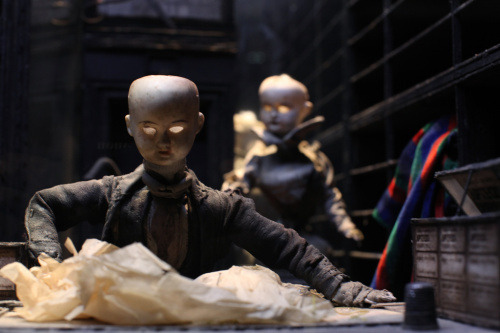 |
| STREET OF CROCODILES |
TIMOTHY: But we are, but IN ABSENTIA was originally commissioned by BBC for television so it's, it's...it was never commissioned as a...We didn't have to shoot in 35 it's just we wanted to and we felt that we needed to but the BBC didn't care it was, and it was destined for TV and that's was, that's was the end of its run when I had two showings on TV. We tried to give it another life by BFI film library or people could just rent it if they...And we entered it into many festivals. So it got a little bit of a circulation and renowned by...
STEPHEN:It won a lot of, it got 12 international prizes, but then nobody knew. How would you know? And from, and then, we said its end was that it simply died inside a, the coffin of a, of a DVD. But in a version of 16x9 on scope, but nobody could be bothered. But then Emily and Nancy pointed out to us, from Zeitgeist, that they actually did a huge, it did, did a huge...a good run in America
TIMOTHY: Well, if it got 30, 30...
STEPHEN: Well, it went to 30 different cities overall, and was projected as 35, but they never told us. So we assumed it was, it just...
TIMOTHY: And then London, it didn't go anywhere.
STEPHEN: No, so...
STEVE: Maybe different audiences that are just crazy over...
STEPHEN: I think it's the, I think it's the whole thing that Timothy said about pairing them. What would you put it up against? Except, unless you showed a program of our films, and then it got in-, included, like what Christopher did.
TIMOTHY Then, then you see them all together...
STEPHEN: Body of works starts to make, uh, coherence...
TIMOTHY: ...or incoherence.
STEVE: That's the thing. It's, it's, it's very odd watching your films back to back. Not that there's a problem with it, but it's like, you, you watch them, and especially when you watch sitting alone in the dark. And you see these huge images projected, and you watch it, and it's like, it ends. And it's like, OK, I need to, like, decompress from this.
TIMOTHY: The bends.
STEPHEN: And then out comes the next one.
STEVE: Ye-, yeah, then it's always the one. And it's like, it's, it's, eh, you know, I do film festivals, and I do stuff like that, and there's times where it's just, I get up and walk out.
QUAYS: Yeah.
STEVE: Because it's like, I can't do that,.And then watching the films again this past Sunday, I was going through everything again. And I was getting to the point where it's like, I'm gonna have to stop this and walk out of the room, and go do something else. Because it's like...I don't mean that in a bad way. I mean that in a really good way, because it's like, th-, what you're seeing is so
STEPHEN: ...it takes a while to get adjusted. When we watch somebody's...It's the same thing, if we watch...
TIMOTHY: Certain other people's...
STEPHEN: ...certain other people's films, that one's so rich, you have to give it a bit of space.
TIMOTHY: Yeah. Yeah.
STEVE: How would you, what would what would be your ideal way to screen films. You know, with something else? With...
QUAYS: Mm.
STEVE: ...you know, with all of your films. I mean, because like, yeah, I needed the retrospect. You've got the here, um, you just had, you had the thing at MOMA was it a year or two ago?
TIMOTHY: Yeah.
STEPHEN: [whispering] 3 years ago.
STEVE: Um...
TIMOTHY: And it needs to be s-, consideration, because that, I know a lot of people who do, someone try to program something, of, of what we've done, and we said, "No, no, no. You mustn't go in that order. They'll be exhausted. You've got to reverse that order. You finish with a certain film. You can't end with that film." You know, the people will just die.
STEPHEN: You have to pace it, in a way. And I'll, actually, I'm going to mention, we go to film fest-, animation film festivals. They're grueling. I mean, you do 90 minutes, it's...Even a feature film is less grueling than animation.
TIMOTHY: Animation.
STEVE: Well, it's all up and down.
STEPHEN: It's up and down.
TIMOTHY: Yeah, it's so intense, and we're jumping from one person to the next.
STEVE: Is, I was thinking, is, it's not, is there any filmmakers now...animators, that you really like?
TIMOTHY: We adore several contemporaries.
QUAY: Who do you like?
TIMOTHY: Well, one's an Estonian called Priit Pärn, and the other one's a Ukrainian called Igor Kovalyov. And there's, there's, these two guys' films are, for us, have always set really high precedence. And it works, totally differently drawn animation, um, I think you can see some on You Tube. [writes names on post-it notes]
STEPHEN: Well, Igor Kovalyov was the guy who was RUGRATS, and that stuff in America, but he would always get to make one film every two years, which the people who did RUGRATS would help subsidize that.
TIMOTHY: (showing his brother a post it note with animators names on it he had just written) Is that Kovalyov?
STEPHEN: Yeah. There might be a Y-O-V at the end. Well, I don't know.
STEVE: (Offering to look up the animators names)I can look it up.
STEPHEN: Y-O-V's, try that. What's it look like?
TIMOTHY (pushing Steve the post it): He's got two versions.
[laughter]
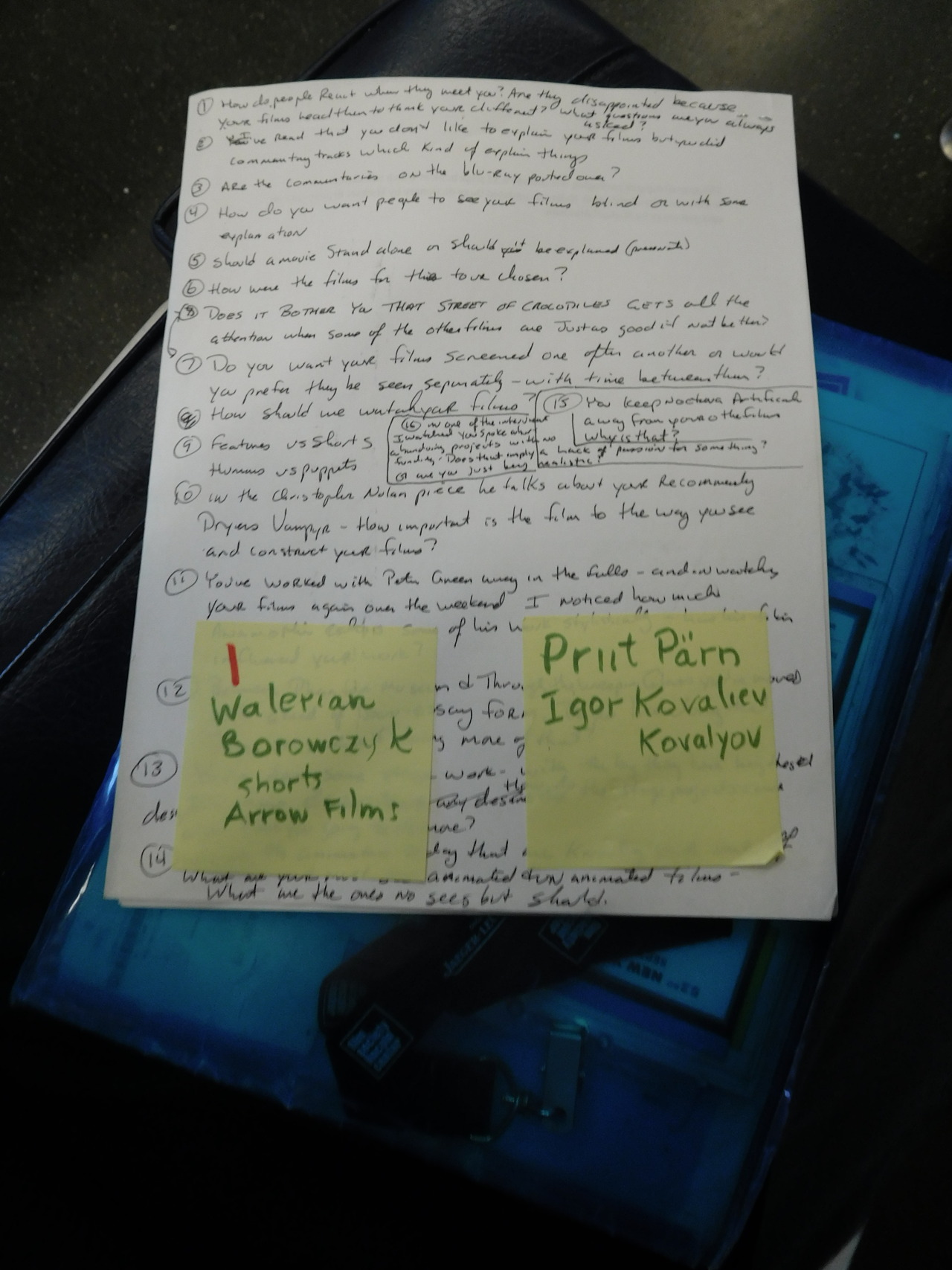 |
| The post-it notes in question on my list of questions |
STEVE: Thank you very much. Um, but, eh, that was in, you know anybody else?
TIMOTHY: Well, there is a historical one, a group we learned directly from, which would have been...
STEPHEN: They're dead.
TIMOTHY: Starevich , Melnitsa Alexeev.
STEPHEN: Alexeev. Norshteyn.
TIMOTHY: Norshteyn. He's alive. The Russian, Norshteyn. They were the big, uh, uh...
STEPHEN: Ja-, Jan Svankmajer.
TIMOTHY: But, we came, we learned...Borowczyk was the great precedent for us. That's what we discovered first, well before Svankmajer, but we did get to meet Svankmajer, and get to know him a little bit. But, uh, yeah. We have our heroes, too.
[laughter]
STEVE: No, Just it's great talking to, somebody who knows, the Eastern or the European animators. It's very strange because in America everybody talks, about Asian or the our own stuff.
QUAY: Yeah.
STEVE: And it's like, you know, I've, I have friends who are ani-, you know, animation fans and they're like, "Oh, you've got to see this stuff. You've got to see this stuff." And it's all Eastern European and all stuff like that and it's like, "Wow." Um. You don't see it. There's this, this...Nobody really realizes it.
STEPHEN: It's sad Yeah, a lot of that stuff just...
TIMOTHY: But also, a lot of the Borowczyk has just come out. A lot of the features have come out just released on DVD in England.
STEPHEN: BFI...
TIMOTHY: No, no, Arrow Films.
STEPHEN: Arrow, Arrow Films. released Borowczyk both the animation films and the majority of the feature films and shortly coming out in America I believe, too.
STEVE: Oh, that's cool.
STEPHEN: These things can all be hunted down, actually.
STEVE: That's what I end up doing is hunting everything down.
STEPHEN: Exactly. What's great, the pursuit.
STEVE: Yeah, it's just I...I almost hate the Internet now because it makes it too easy to find so-. Because it's like when I discovered you and it was, you know, VHS and stuff. [laughter] And it was like, "What else do they have?" And it's like, "How do I get a copy of it?"
[laughter]
Steve: You know it's that sort of...
STEPHEN: It's like Sammy's done, isn't it? Like these underground tapes.
STEVE And, you know, but now it's like you just Google it. Or who has it, you know? It's...
TIMOTHY: Exactly. You can get to things very quickly now. Yeah, I agree.
STEVE: Since you're talking about finding things, you say in the [New York Times] article Christopher Nolan said that you had turned him on...He had never seen "Vampire" or "Vampyr". How do you say it?
TIMOTHY: Oh yeah, VAMPYR
STEVE: VAMPYR
STEPHEN: VAMPYR yeah.
STEVE: How, how, how influential is that to your, to your films? I mean, I can see some of the like the dreamlike nature of stuff.
TIMOTHY: It's one of the earliest films we ever saw at art school and it, it, it was a seminal viewing that saw when we first saw Dreyer's JOAN OF ARC and VAMPYR and then DAY OF WRATH I think we must have been first year.
STEPHEN: 18.
TIMOTHY: Yeah, 18, 19.
STEPHEN: Plus UN CHIEN ANDALOU
TIMOTHY: Yeah, to, to this day still VAMPYR" is one...
STEPHEN: I remember out of the, the anecdote, whose the camera operator of Dreyer...
TIMOTHY: Um, Rudolph Mate.
STEPHEN: Rudolph Mate that one of the...There was a mistake and it, again, was what you'd classify as, as an accident, where the light came hit the lens and created this kind of filterization of the, of the image and made it very gray and translucent. And that was something that really knocked us out.
QUAYS: But, no, it's, you know, on "Vampyr." The camera, and then Dreyer, when he saw the defect he said, "How did, how did that happen?" And he tried to sort it out and he said, "Well, I think there was a stray light that hit slightly into the lens." And said he fogged it. Dreyer said, "That's exactly what I want. It has to be this veil of, veil. You know, pushing through this veil of gray, mystery gray." And then, it's true. In a way, it's the same thing with the, with the sense of sound in that film. It all comes from behind a pillow. That's, that's our impression.
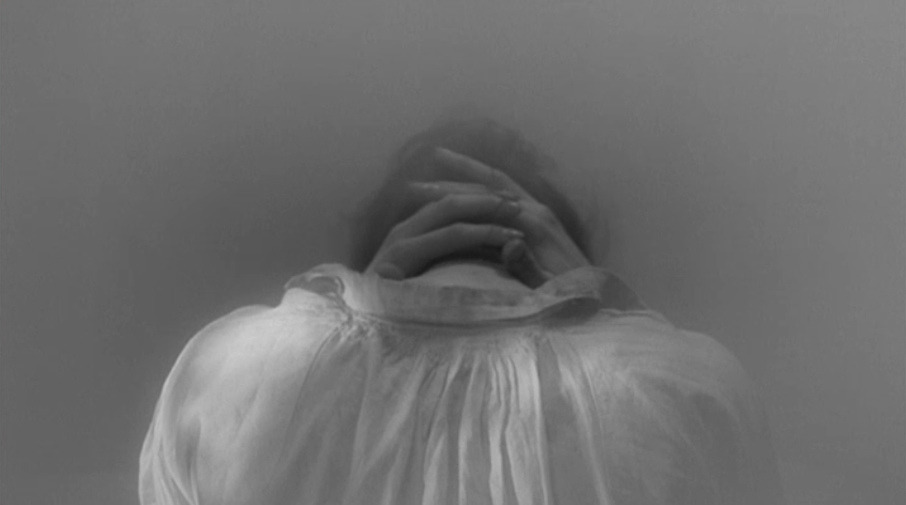 |
| IN ABSENTIA |
STEVE: Do you, with the lighting, how, because with IN ABSENTIA... you watch the film and it's you playing with the light. I don't think you really play with light as much as you do in that film?
TIMOTHY: Oh, that, that was pretty much left to...It happened under the camera. We just sat there and trapped it, because as the sun rose there were clouds sc-, scuttering across the, scuttering across the sky, so it created this, this flicker effect and the exposure was set so that, that the, if the sunlight really came through it sort of burned the, the film stock. So, that's what makes it feel quite, it's like electric,
STEPHEN: Electric. There's an electricity in the light, but it matches the music, yeah, and her condition, which we felt. It was her psychic state was like, it was this...[A knock at the door] Oh God, five minutes. Anyway that, that, so it was us marshalling forces and just basically trapping it,
TIMOTHY: trapping the light, making the montage, too.
STEPHEN: So, the Russians would come back and you'd go, "God, look at that effect." [laughs]
TIMOTHY: You can't plan for it
STEPHEN: Other than anticipate it.
TIMOTHY: Yeah, it would just happen. Some days it was just pure sun, not a cloud in the sky. You wouldn't get any of those electric effects. The next day they were blossoming left, right and center. So, it was like you, you'd, uh, you know, it was like a, and experimentally laboratory where on certain days you just captured a whole bunch of lighting effects like that and they get, we just, marshalled them throughout the film.
STEVE: How much did you shoot because...?
STEPHEN: One to seven was our ratio. One to seven, so for every seven feet of film we only used one, or for every thousand...
TIMOTHY :We shot a lot on that particular film
STEVE: It's so dependent on the, on the light as you're saying. It's an accident. Whatever we're going to get is until we get...
QUAYS: Exactly.
STEVE: I'm going to ask you a question about the commentary tracks. I've read that you guys don't like to explain your films, but you've done these commentary tracks. I mean a lot of them are technical..
STEPHEN: Yeah, that's ....I think they're just technical.
STEVE: No, no but if you're listening to the one that you did for "STREET OF CROCODILES and a couple of the others, things get in there. "Well, this is this and this is that. And it's like..."
STEPHEN: We give it away.
STEVE: You give little things. Do you,want everybody to figure it out yourself, or do you want...?
TIMOTHY: Well, I think it's like music. Music doesn't tell you what it is. You, you have to, you have to feel it, and, and for you it's something you articulate, articulate with yourself. I guess unless you're a music reviewer. Then you have to sort of come up with a lot more, like, because that was in D minor, you know...
STEPHEN: Or this sequence had seven bassoons....
[laughter]
TIMOTHY: Exactly.
STEPHEN: Which gave a weird effect that worked so....
STEVE: Yeah, the reason I was, I was curious about that meaning and stuff is I've beenrunning across a lot of films recently where it's like, I'll watch a movie and then you read the press notes and they tell you everything that's in the movie.But you read the press notes for your films and there's really not...It's like basic plot or as much of a plot as there is.
TIMOTHY: It's minimal. It's very minimal. But I think it's something that you, it's, it's, I think it give you the chance to interpret elements that we've laid. I think we've laid them intelligently but within, within an idea that you're, you're moving forwards through space and time. But we're not going to give you a lot of handholds.
And that you have to feel it out and then you've, you, I mean CROCODILES is a journey through a zone until you finally go into, to a tailor who invites you to a rare room, who's going to show you things you didn't expect to be, be shown and, but then he also reals, reveals the workings of, it's like he the, the whole workings of the zone is almost like it, it, it's little visions of the screws coming loose like this. An arm suddenly goes out of sync and, and then suddenly the zone breaks down and I...Oh, then it also then implodes, um, and...
STEPHEN:...eventually the the knot reforms....
TIMOTHY: And the knot reforms that once it... It loosens.
STEPHEN: You want to loosen the idea...The sense of, sense of... Sense of where it will go. It all tightens, reforms, and closes it down.
TIMOTHY: Closes down. The theater curtain comes down.
STEPHEN: Down, and you're, you're left with the enigma I guess.
TIMOTHY: Which is the final text of Bruno Schulz.
STEPHEN: Yeah.
TIMOTHY: Which doesn't elucidate a lot.
STEPHEN: No.
TIMOTHY: Psychology.
STEPHEN: We couldn't afford anything big [laughs] yeah.
TIMOTHY: It doesn't help.
STEVE: No it doesn't. It just is.... that's one of the things I love about your films is you don't, you have to be f- you have to fumble with them.
TIMOTHY: Yeah, I think you, I think you just act like your radar out, and it can take a lot of interpretation.
STEPHEN: That's a great title. It's like the fumbled football.
TIMOTHY: Everybody chases...
STEPHEN: And the scenes going...
STEVE: Do you, do you have, do you have, have you ever had,people come up to you and tell you, ask you about things that you've, like, never considered, or you never thought were in your films?
STEPHEN: Oh, yeah, yeah. All the time.
STEVE: Do they, do you ever see that they're right? Or, t-that's a weird question. Do you think they're onto something you may have missed.
TIMOTHY: I think it just opens up that, that if, if viewed from this angle, that's very interesting what the person says. But, uh...
STEPHEN: But I think it's, what, um, Stephanie said from The Village Voice that the, uh, in the end of, uh, um, IN ABSENTIA that all the letters that Emma Hauck could send to her husband which never reached him, our, ours was the final letter that was sent to the world.
TIMOTHY: To reach, to reach Emma Hauck.
STEPHEN: Right.
TIMOTHY: ...were to release her. That's a nice, nice, uh, poetic.
STEPHEN: Metaphor.
TIMOTHY: Yes, exactly.
STEVE: Do you plan on doing more features?
TIMOTHY: We've had one in the works for about nine, nine years. "Sanatorium Under the Sign of the Hourglass" is the other big Bruno Schulz novella that we've, we've - the scripts' been going. We have half the money. That's it. We've already started 20 minutes of it, filmed it.
STEVE: Is it animated or live action?
STEPHEN: It's anima...
TIMOTHY: It's 75 percent animation and 25 percent live action. So...we've started with the animation already.
STEVE: Because one of the things I was going to ask you is you know, you've done, you've done feature live action but not, you know, not feature, ani - animated.
STEPHEN: No, no. I know.
TIMOTHY: It's, uh, it's going that direction. It's two years' work basically. So, uh.
STEVE: I would take this as like one of your passion projects 'cause in one, one of the commentaries, one of the interviews, you talked about how, like, you'll do a comic... you'll take a project, and if you can get funding and then if you don't get funding you'll move onto something else and then something else...
STEPHEN: Right.
STEVE: It sounds like you're not absolutely tied to something, or you're going to hang on to it for, you know...
STEPHEN: Well, I think certain ones we hang on to [laughs] maybe knuckles are getting a little white on this one, but we're hanging onto the SANATORIUM project, being by hook or by crook, we want to film this in any reductional or even if it has to be full of animation, do it. We are hoping it won't be that way.
STEVE : Have you thought like Kickstarter or Indigo-go...?
TIMOTHY: Yeah. It's all sort of there to be considered in which direction to go, but...
STEPHEN so far the Dutch .... the Dutch and the BFI are on board.
STEVE: Its weird the Dutch seem to do a lot of work with Peter Greenaway or what?
QUAYS: Yeah.
STEVE: It's like Peter Greenaway...
A QUAY: They always have.
[knock]
STEVE: Uh oh, they're coming. They're coming...
QUAYS: We're coming to get you.
STEVE: Did you...Oh God, what's the film? There's one of the films with the...
TIMOTHY: ...ZED AND TWO NAUGHTS?
STEVE: No, no you did...
STEPHEN: THE FALLS? THE FALLS?
STEVE: No. Animated, um, with perspective, it's like white...
STEPHEN: ANAMORPHOSIS?
STEVE: That's it! Did Greenway influence you in that, or cause there's a lot of his stuff is... it was weird watching that because I was just watching some Greenway, as well. And it's just like some of what you're doing there is very close to some of what he's doing now.
TIMOTHY: We saw a sequence the other day in this film he did in Poland and he actually lifted a sequence from PIANO TUNER (OF EARTHQUAKES)
STEVE: Really?
TIMOTHY: Yeah. We haven't written to him yet.
STEVE: Are you on Friendly terms with him??
STEPHEN: Yeah.
[Emilie enters]
EMILIE Thank you Steve. Thank you schlepping into the city
STEVE: Thank you. No for these guys I'd trek across country.
[laughter]
STEVE: You know what, you're laughing. You guys, you were two of my favorite directors of all time. And I would move heaven and earth to see you
STEPHEN: How far did you come?
STEVE: Just from Long Island. But it's just, like I took a day off from work. And I asked if I could interview you and she's like yeah. And I'm like I'm there.
[laughter]
STEVE: Can I take a picture with you guys? Of you guys?
TIMOTHY: Yeah. Yeah, OK.
STEVE: I'll just...
TIMOTHY: Where do you want to sit? Just here.
STEVE: Ah wherever is good for...
TIMOTHY: Where do you want to be? Do you want to be with us?
STEVE: If I can. That, that, that would be awesome.
[Two photos are taken]
[laughter]
STEVE: Thank you. You just made my day, and probably my year.
QUAYS: Thank you...
The Zeitgeist Bluray of the Quay's film hit stores November 24


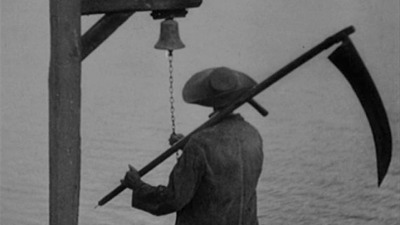
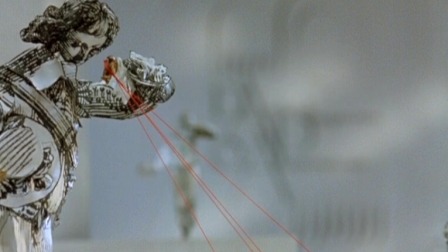
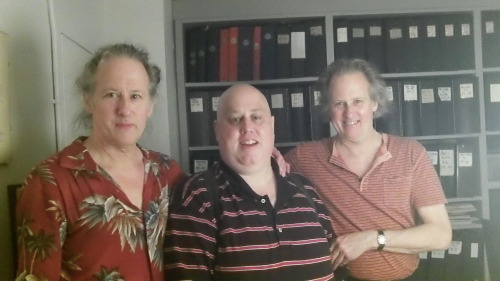
No comments:
Post a Comment